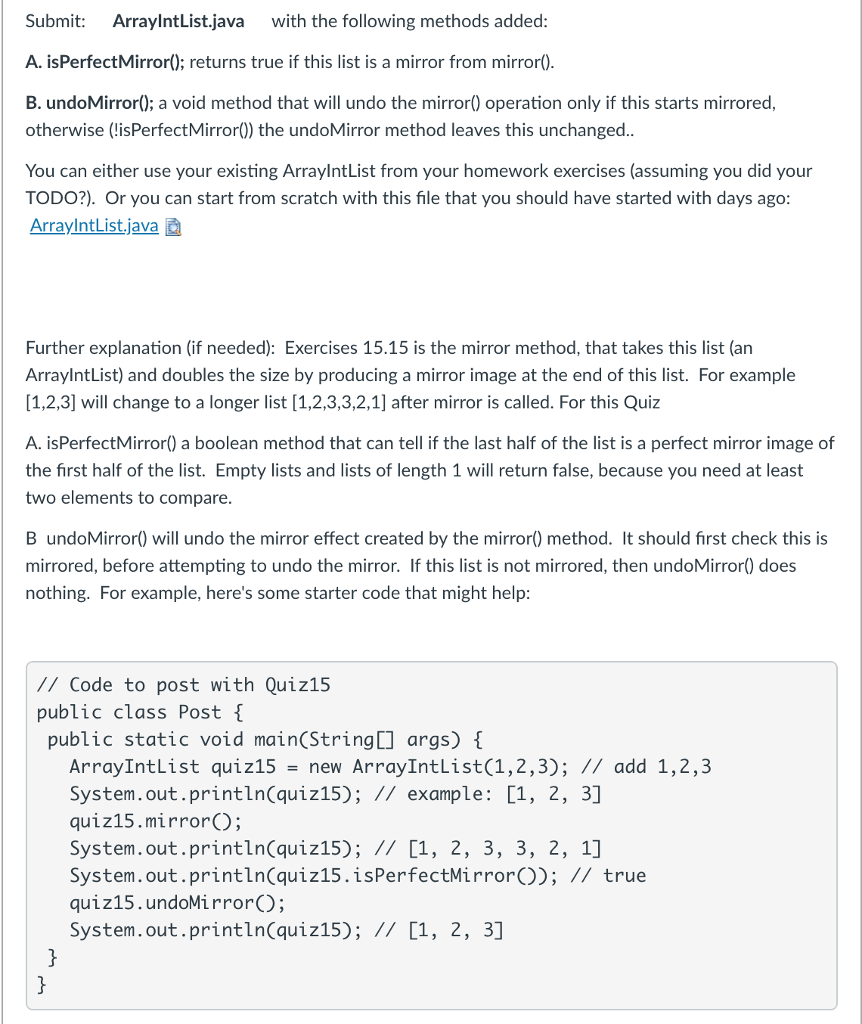Question
please help me with this quiz. I would really appreciate it!! It is due soon!! thank you!! import java.util.Arrays; import java.util.Iterator; import java.util.Collection; import java.util.NoSuchElementException;
please help me with this quiz. I would really appreciate it!! It is due soon!! thank you!!

import java.util.Arrays;
import java.util.Iterator;
import java.util.Collection;
import java.util.NoSuchElementException;
// BJP code fixed (by W.P. Iverson, 2017) to import only what's needed
// Class ArrayIntList can be used to store a list of integers.
//
// Most of this code from
// http://practiceit.cs.washington.edu/problems/shared/ArrayIntList.java
//
// Reges and Stepp provided inner class iterator (see end of file)
// and also provided (...) arguments as use in constructor
public class ArrayIntList implements Iterable
private int[] elementData; // list of integers
private int size = 0; // current number of elements in the list
public static final int DEFAULT_CAPACITY = 10;
// YOUR CODE GOES HERE
// post: constructs an empty list of default capacity
public ArrayIntList() {
this(DEFAULT_CAPACITY);
}
// pre : capacity >= 0
// post: constructs an empty list with the given capacity
private ArrayIntList(int capacity) {
if (capacity
throw new IllegalArgumentException("Capacity must be at least 0: " + capacity);
}
elementData = new int[capacity];
}
// for creating test cases more easily, Reges provided ... arg
public ArrayIntList(int... elements) {
this(Math.max(DEFAULT_CAPACITY, elements.length * 2));
for (int n : elements) {
add(n);
}
}
// for creating test cases more easily (a dupe of the above constructor)
public static ArrayIntList withValues(int... elements) {
ArrayIntList list = new ArrayIntList(Math.max(DEFAULT_CAPACITY, elements.length * 2));
for (int n : elements) {
list.add(n);
}
return list;
}
// for creating test cases more easily
public ArrayIntList(int element, boolean notCapacity) {
this();
add(element);
}
// for creating test cases more easily
public ArrayIntList(Collection
this(Math.max(DEFAULT_CAPACITY, elements.size() * 2));
for (int n : elements) {
add(n);
}
}
// copy constructor; for creating test cases more easily
public ArrayIntList(ArrayIntList list) {
this(Math.max(DEFAULT_CAPACITY, list.size() * 2));
addAll(list);
}
// pre : size()
// post: appends the given value to the end of the list
public void add(int value) {
add(size, value);
}
// pre: size()
// post: inserts the given value at the given index, shifting subsequent
// values right
public void add(int index, int value) {
checkIndex(index, 0, size);
ensureCapacity(size + 1);
for (int i = size; i > index; i--) {
elementData[i] = elementData[i - 1];
}
elementData[index] = value;
size++;
}
// post: appends all values in the given list to the end of this list
public void addAll(ArrayIntList other) {
for (int i = 0; i
add(other.elementData[i]);
}
}
// post: list is empty
public void clear() {
size = 0;
}
// post: returns true if the given value is contained in the list, false otherwise
public boolean contains(int value) {
return indexOf(value) != -1;
}
// post: ensures that the underlying array has the given capacity; if not,
// the size is doubled (or more if given capacity is even larger)
public void ensureCapacity(int capacity) {
if (capacity > elementData.length) {
int newCapacity = elementData.length * 2 + 1;
if (capacity > newCapacity) {
newCapacity = capacity;
}
int[] newList = new int[newCapacity];
for (int i = 0; i
newList[i] = elementData[i];
}
elementData = newList;
}
}
// returns true if o is an ArrayIntList with the same size and elements as this one
public boolean equals(Object o) {
if (!(o instanceof ArrayIntList)) {
return false;
}
ArrayIntList other = (ArrayIntList) o;
if (this.size != other.size) {
return false;
}
for (int i = 0; i
if (elementData[i] != other.elementData[i]) {
return false;
}
}
return true;
}
// pre : 0
// post: returns the integer at the given index in the list
public int get(int index) {
checkIndex(index);
return elementData[index];
}
// post: returns capacity of this list's underlying array
public int getCapacity() {
return elementData.length;
}
// post : returns the position of the first occurence of the given
// value (-1 if not found)
public int indexOf(int value) {
for (int i = 0; i
if (elementData[i] == value) {
return i;
}
}
return -1;
}
// post: returns true if list is empty, false otherwise
public boolean isEmpty() {
return size == 0;
}
// post: returns an iterator for this list
public Iterator
return new ArrayIntListIterator(this);
}
// pre : 0
// post: removes value at the given index, shifting subsequent values left
public void remove(int index) {
checkIndex(index);
for (int i = index; i
elementData[i] = elementData[i + 1];
}
size--;
}
// post: removes all occurrences of the values in the given list from this list
public void removeAll(ArrayIntList other) {
int newSize = 0;
for (int i = 0; i
if (!other.contains(elementData[i])) {
elementData[newSize] = elementData[i];
newSize++;
}
size = newSize;
}
}
// pre : 0
// post: replaces the integer at the given index with the given value
public void set(int index, int value) {
checkIndex(index);
elementData[index] = value;
}
// post: returns the current number of elements in the list
public int size() {
return size;
}
// post: returns an array version of the contents of this list
public int[] toArray() {
return Arrays.copyOf(elementData, size);
}
// post: creates a comma-separated, bracketed version of the list
public String toString() {
String result = "[";
for (int i = 0; i
if (i > 0) {
result += ", ";
}
if (i
result += elementData[i];
} else {
// student's code is bogus; OOB
result += "OOB!";
}
}
result += "]";
return result;
}
// helpers to make sure indexes do not fall out of bounds
private void checkIndex(int index) {
checkIndex(index, 0, size - 1);
}
private void checkIndex(int index, int min, int max) {
if (!(min
throw new ArrayIndexOutOfBoundsException("Illegal index " + index +
"; must be between " + min + " and " + max + " "
+ "list : " + toString() + " (size=" + size + ") "
+ "array: " + Arrays.toString(elementData) + " (capacity=" + elementData.length + ")");
}
}
// Stuart Reges
// 4/4/05
//
// The ArrayIntListIterator class provides a set of utilities for iterating
// over an ArrayIntList and possibly removing values from the list.
public static class ArrayIntListIterator implements Iterator
private ArrayIntList list; // list to iterate over
private int position; // current position within the list
private boolean removeOK; // whether it's okay to remove now
// pre : list != null
// post: constructs an iterator for the given list
public ArrayIntListIterator(ArrayIntList list) {
this.list = list;
position = 0;
removeOK = false;
}
// post: returns true if there are more elements left, false otherwise
public boolean hasNext() {
return position
}
// pre : hasNext()
// post: returns the next element in the iteration
public Integer next() {
if (!hasNext())
throw new NoSuchElementException();
int result = list.get(position);
position++;
removeOK = true;
return result;
}
// pre : next() has been called without a call on remove (i.e., at most one
// call per call on next)
// post: removes the last element returned by the iterator
public void remove() {
if (!removeOK)
throw new IllegalStateException();
list.remove(position - 1);
position--;
removeOK = false;
}
}
}
Step by Step Solution
There are 3 Steps involved in it
Step: 1

Get Instant Access to Expert-Tailored Solutions
See step-by-step solutions with expert insights and AI powered tools for academic success
Step: 2

Step: 3

Ace Your Homework with AI
Get the answers you need in no time with our AI-driven, step-by-step assistance
Get Started


